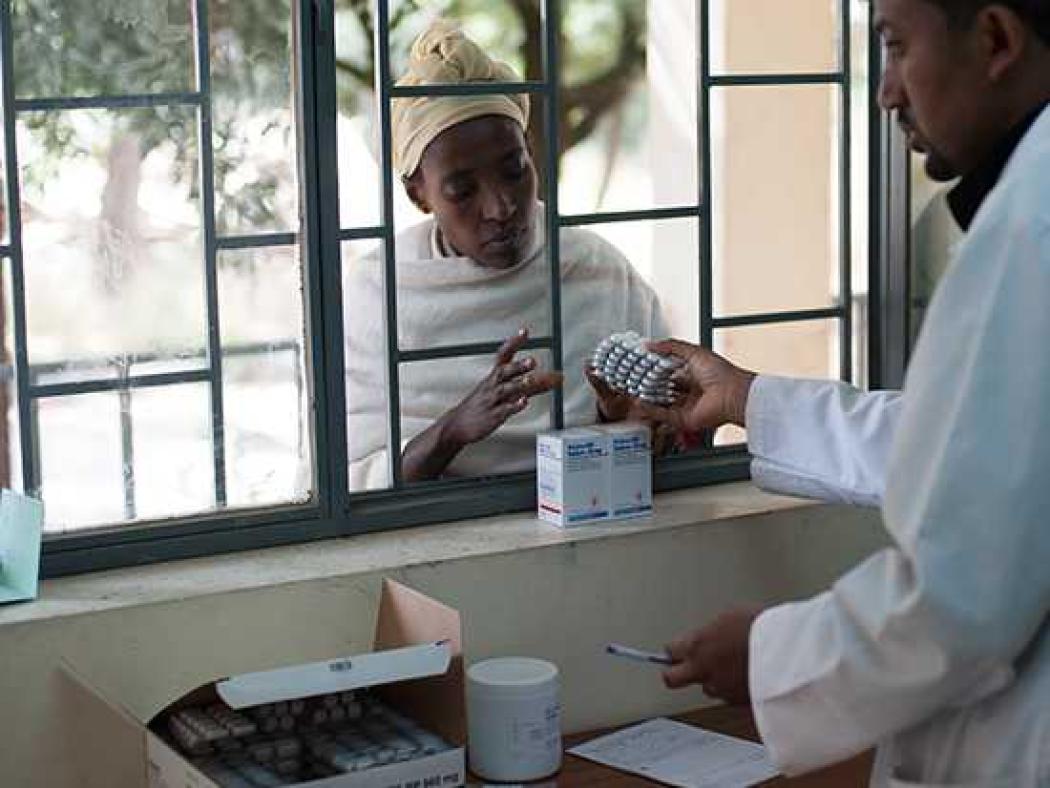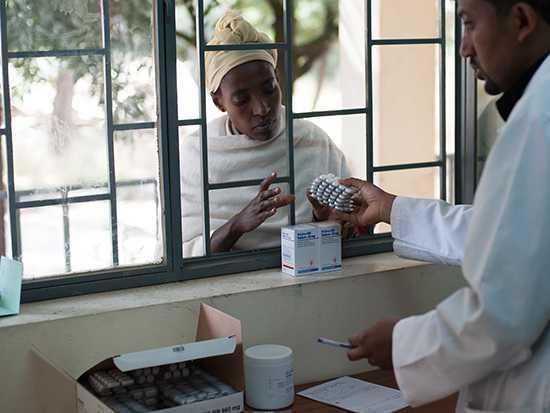How One Pharmacist Can Make a Difference: Transforming Ethiopia’s Pharmaceutical Sector

By Annette C. Sheckler, Management Sciences for Health Ayelew Adinew was working as a pharmacist in a large public hospital in Addis Ababa, Ethiopia. He looked around and saw that the 100-year old pharmaceutical system was broken. There was no transparent and accountable system for providing the information needed for effective monitoring and auditing of pharmaceuticals and other commodities. There was not sufficient documentation to track consumption, inventory discrepancies, wastage, product over-stock or under-stock. There were no procedures to ensure the availability of essential medicines. The regulations were outdated and there was no enforcement of the relevant regulations in place to protect the safety of clients, ensure proper utilization of resources, and deter professional malpractice. Physically, the pharmacy space was too small with no separate area for patient counseling. Essential equipment was missing and there was no transport for procurement. Managing medicines transactions had not been systematized; therefore the dysfunctional work flow was a deterrent to timely service delivery, convenience for clients, and the efficiency of the service provider. The pharmacy system clearly needed reform.  A SIAPS supported pharmacist hands medicine to a woman in Ethiopia. Courtesy Management Sciences for Health. Ayelew Adinew stood on the frontlines of the pharmacy. He could see the fundamental transformation that was needed to fix Ethiopia’s broken pharmaceutical system. Ayelew decided that he could be a more effective agent of change in the public health sector and was hired as a technical specialist for USAID-funded Systems for Improved Access to Pharmaceuticals and Services (SIAPS) Program. SIAPS, implemented by Management Sciences for Health, is a global health project that uses a systems-strengthening methodology to assure the availability of quality pharmaceutical products and effective pharmaceutical services. The end result is better health outcomes. At SIAPS, Ayelew believed he would have the support to develop the tools needed to transform Ethiopia’s pharmacies into modern, well-functioning facilities that are auditable and accountable. SIAPS senior management, along with the technical staff, immediately recognized the value of Ayelew’s vision and gave him the support he needed to go forward with this transformative undertaking. According to Ayelew, “I was igniting the fire, SIAPS was adding the fuel.” Working with spreadsheets, Ayelew began to break down each of the steps in all of the processes of a working pharmacy. Ayelew mapped out the flow of medicines and supplies through a health facility system. He created new tools and forms such as vouchers, sales tickets, and dispensing registers to organize and record the information. The next phase was testing the new system. Debre Markos Hospital is a large referral hospital located in one of the regional states. There, this new system was piloted and given the name, Auditable Pharmaceutical Transactions and Services (APTS). The pharmacy and accounting staff, including cashiers and auditors, were training on the APTS system. Today, there is legislation in four regions requiring APTS implementation in all pharmacies. Also, the Federal Ministry of Health has just signed the directive that covers the entire country requiring implementation of APTS. One pharmacist, Ayelew Adinew, had a vision for fixing a broken pharmaceutical system that fell far short of serving the people of Ethiopia. With the help of his colleagues at USAID-funded SIAPS, the generosity of the American people, and the support of Ethiopia’s Ministry of Health and other partners in the government, Ayelew was able to rise to the level of a public health champion. Everyone wins. For more information, please visit www.siapsprogram.org.
A SIAPS supported pharmacist hands medicine to a woman in Ethiopia. Courtesy Management Sciences for Health. Ayelew Adinew stood on the frontlines of the pharmacy. He could see the fundamental transformation that was needed to fix Ethiopia’s broken pharmaceutical system. Ayelew decided that he could be a more effective agent of change in the public health sector and was hired as a technical specialist for USAID-funded Systems for Improved Access to Pharmaceuticals and Services (SIAPS) Program. SIAPS, implemented by Management Sciences for Health, is a global health project that uses a systems-strengthening methodology to assure the availability of quality pharmaceutical products and effective pharmaceutical services. The end result is better health outcomes. At SIAPS, Ayelew believed he would have the support to develop the tools needed to transform Ethiopia’s pharmacies into modern, well-functioning facilities that are auditable and accountable. SIAPS senior management, along with the technical staff, immediately recognized the value of Ayelew’s vision and gave him the support he needed to go forward with this transformative undertaking. According to Ayelew, “I was igniting the fire, SIAPS was adding the fuel.” Working with spreadsheets, Ayelew began to break down each of the steps in all of the processes of a working pharmacy. Ayelew mapped out the flow of medicines and supplies through a health facility system. He created new tools and forms such as vouchers, sales tickets, and dispensing registers to organize and record the information. The next phase was testing the new system. Debre Markos Hospital is a large referral hospital located in one of the regional states. There, this new system was piloted and given the name, Auditable Pharmaceutical Transactions and Services (APTS). The pharmacy and accounting staff, including cashiers and auditors, were training on the APTS system. Today, there is legislation in four regions requiring APTS implementation in all pharmacies. Also, the Federal Ministry of Health has just signed the directive that covers the entire country requiring implementation of APTS. One pharmacist, Ayelew Adinew, had a vision for fixing a broken pharmaceutical system that fell far short of serving the people of Ethiopia. With the help of his colleagues at USAID-funded SIAPS, the generosity of the American people, and the support of Ethiopia’s Ministry of Health and other partners in the government, Ayelew was able to rise to the level of a public health champion. Everyone wins. For more information, please visit www.siapsprogram.org.
